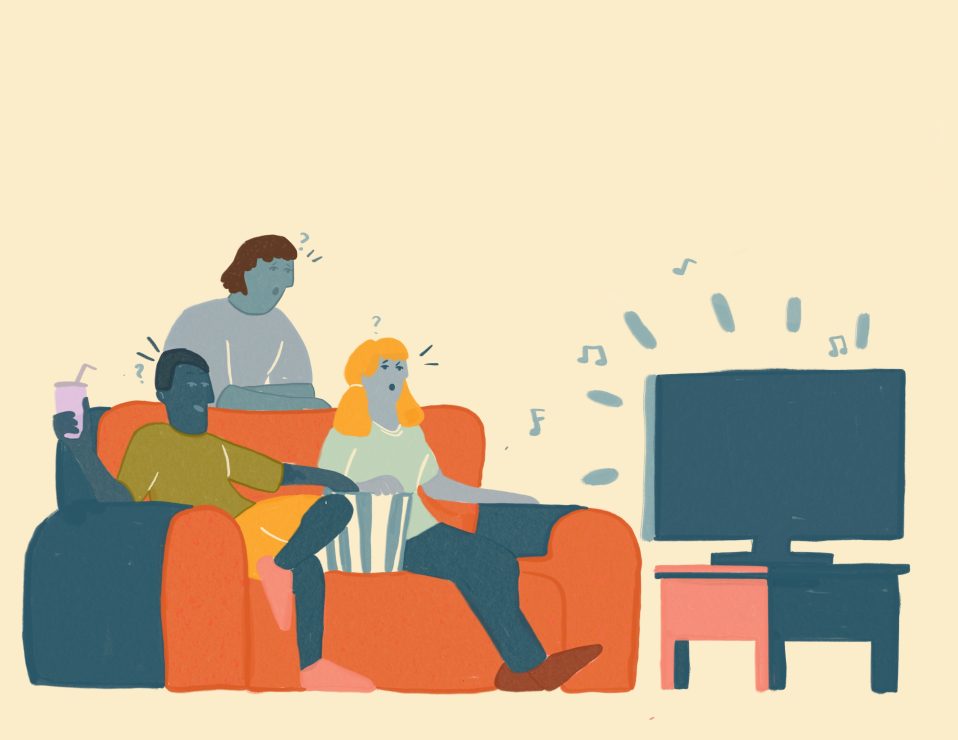The creative teams of current movie musicals are terrified to present their films’ musical soundtracks

Illustration by Chloe Latour.
Imagine it’s summer 2024. A trailer for Wicked the movie-musical, coming out in November, appears on your explore page. You’re waiting for the first few notes of “Defying Gravity” or “Popular” to kick things off.
Instead, pop star Sabrina Carpenter busts down a door wearing green face paint and speaks directly to the camera: “Now, we’re defying gravity.”
Then, her hit song “Nonsense” plays over clips of full-blown choreographed musical numbers.
You’d be confused, right? Well, if the way that movie-musicals are marketed doesn’t change in the next six months, spotlighting famous faces, forcing random cameos, and omitting the entire soundtrack might become trendy ways creative teams trick audiences into thinking their films aren’t musicals. I’ll be the first to say that this half-movie half-musical trend is falling flat with film and musical enjoyers alike.
It started with Wonka, the third film adaptation of Charlie and the Chocolate Factory by Roald Dahl, back in December. The teaser featured lady’s man Timothee Chalamet as Willy Wonka inventing candy and chatting with quirky characters played by famous actors like Olivia Coleman and Hugh Grant. I nearly missed the cinematic cover of “Pure Imagination” because it was instrumental. This convinced many it was a regular movie.
After seeing this film, my roommate reported that it’s a musical with dance numbers and 11 original songs. The 1971 movie had a musical soundtrack, and Charlie and the Chocolate Factory: A New Musical exists with a moderate fan base, so why wouldn’t Wonka promote the new songs to draw those people in? In my opinion, the marketing team loses their general audience and their target audience –– musical fans –– by hiding the film’s stage-show qualities.
When the first trailer for the 2024 Mean Girls came out in November, musical theatre fans on social media noticed the trailer contained an overwhelming number of shots of heartthrobs Reneé Rapp and Christopher Briney, and was backed by a popular pop-rock song by Olivia Rodrigo. There were seven pop-up celebrities in the two-minute teaser, none of whom sing in the film and a few who aren’t named characters.
The most confusing aspect was the absence of the Broadway soundtrack. It was clear there would be theatrical influence when Reneé Rapp –– who played Regina George on Broadway –– was brought onboard, but despite her popularity and technically strong voice the team still chose not to tease her songs. While we all adore Olivia Rodrigo, she is not in the movie and neither is her song from the trailer.
I attended the movie after its release on Jan. 12, unsurprised to see another genuine, choreographed musical. Although, it seemed like the directors were afraid to commit; only 11 of the 21 tracks from the Broadway musical were included and many shifted genres so they sounded like TikTok songs rather than showtunes. Furthermore, the actors playing protagonist Cady and her love interest, Aaron, wanted to deemphasize their own vocals in their roles so opted out of most of their characters’ songs.
It’s clear why most tracks weren’t in the trailer after being butchered into hollow, digital beats. Songs like “Revenge Party” and “World Burn” are fan favourites though, and were recreated too well to be tossed aside. Overall, both the Wonka and Mean Girls trailers seem to have left audiences with muddled expectations.
This is to say that I miss early 2000s musical trailers like Hairspray and Mama Mia that included up to five songs and made the public fall in love with the soundtrack. Unlike “You Can’t Stop the Beat” and “Dancing Queen“, the average movie-goer can’t sing the words to songs in Mean Girls. Unfortunately it’s not because they aren’t good songs, but because they’ve been deliberately hidden in their films’ advertising.
The 2004 Mean Girls set the bar high and shaped our childhoods –– the musical theatre community would not have hopped on the bandwagon otherwise. But we also love the musical, in all of its campy glory! To the creative teams of upcoming half-movie half-musicals: commit to one style and own it in your advertising. If you can’t satisfy all of your audience, at least try for half.
We don’t want Elphaba and Glinda to sing anything from Reputation (Taylor’s Version). Please.







